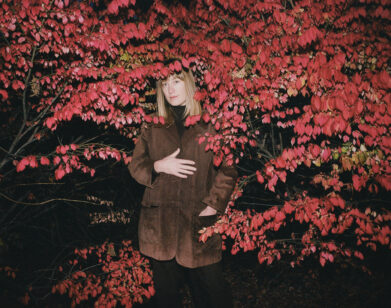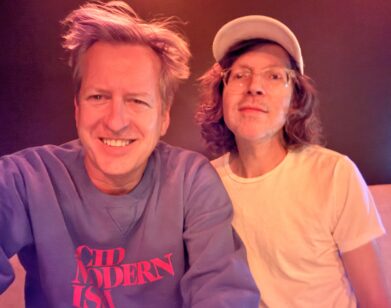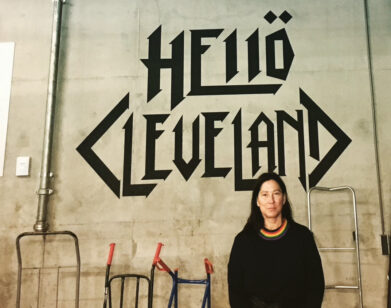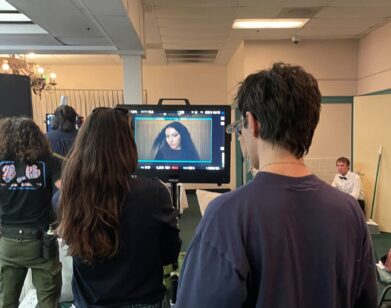Zach Condon, Homecoming King
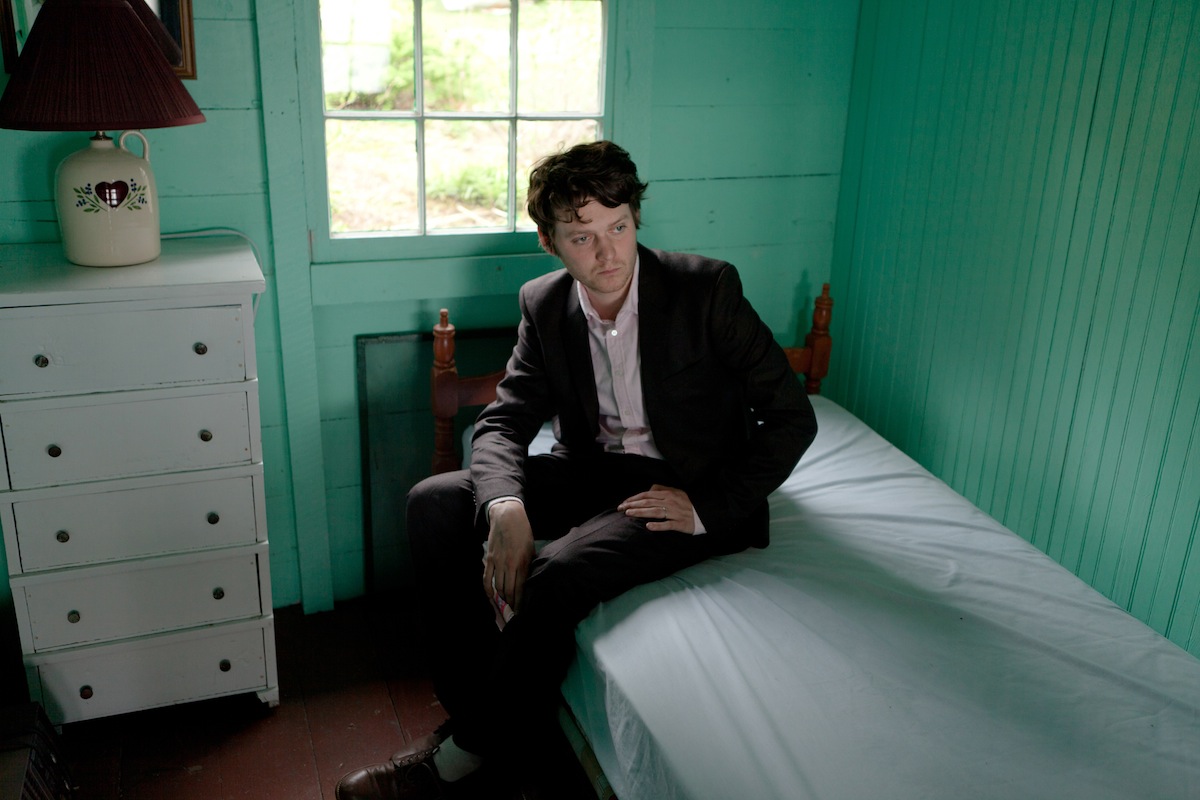
BEIRUT’S ZACH CONDON. PHOTO COURTESY OF KRISTIANNA SMITH
Zach Condon’s globetrotting may not be over, but he seems to have taken a breather. The horn-blowing, uke-strumming crooner emerged as a teen onto the mid-aughts indie scene and was rarely written about without being called a “wunderkind.” He earned a reputation as a 21st-century Phileas Fogg, doing Around the World in Just a Few Years. Condon adopted as a band name a city that is itself a cultural crossroads, Beirut, and right from the start they touched down in one spot in the world atlas after another—the Balkans, France, Mexico, Brazil (at least for a cover and a rather rabid cult following)—simultaneously mining the spot’s musical history and folding it into an unmistakable Beirut sound.
But just when you thought Beirut were forever musical magpies, and wondered where they would land next (Morocco, maybe? Condon did it. India? Noted. Spain?), Condon throws a curveball: he’s come home. He wrote his third full-length, the simpler, piano-based The Rip Tide, alone in a farmhouse in upstate New York, where no passport was needed; he’s singing about spots with a US zip code, like “East Harlem” and his native “Santa Fe;” and he is writing more personally than ever, notably on songs like the spare, wistful “Goshen.” Condon has been away too long, but he needed a year to do some living, which included getting married in 2010, to longtime girlfriend Kristianna Smith. It was on their back porch in Brooklyn that we sat down to talk, in anticipation of another remarkable album, the long-awaited The Rip Tide.
JOHN NORRIS: Zach, it has been some time—two and a half years since the EPs and kind of unbelievably almost four since The Flying Club Cup.
ZACH CONDON: It has been a while. I felt like I needed to get a few side projects out of my system before I settled in to do the new record.
NORRIS: I imagine it’s real easy to fall into a cycle of record, tour, record, tour. And I would think that you wouldn’t want to repeat that too much.
CONDON: That’s usually what’s asked of you, everything’s a year cycle, you know. When you get caught up in that cycle, it can be kind of brutal, actually. It was good I got to take a year off, with no pressure coming from anywhere, really. That was really nice.
NORRIS: So you never felt like, “Oh, I’m on the clock, and I’d better get going with something”?
CONDON: You can never not feel like that, as a working artist these days. It’s funny—time off makes me nervous, but so does time on. At least the pressure wasn’t coming from outside.
NORRIS: The last we really heard from you was the ’09 double EP March of the Zapotec and Realpeople Holland. And it seems like the Holland portion in particular—comprised of these older electronic recordings of yours—got so much attention, in fact attention from some quarters that maybe even the first couple of albums didn’t. Did that surprise you?
CONDON: It surprised me quite a bit, I mean I released that side of things really as kind of an introduction to where I came from musically, back in the day when all I had was a keyboard, a drum machine, and a four-track. So I was doing these little synth-pop ditties, and it’s how I learned to write. And so I would throw it on at parties and stuff, people wanted to hear the old stuff, and they were always bugging me, “Oh, you gotta put some of that out!” And it’s just not an image I had ever put out about myself—you know, the bedroom synth guy. The whole thing seemed ridiculous. So when I put it out, I did so with caution, and with a sense of humor about it. And when it did get a lot of attention, yeah, I was really surprised.
NORRIS: So no chance of a synth-pop move for you?
CONDON: No, I moved away from that years ago, and it doesn’t feel right going back to that. It feels much more natural to move forward and grow with the instruments I’ve grown accustomed to. Piano, accordion, brass, ukulele.
NORRIS: It remains to be seen what the reaction press-wise to the sound of The Rip Tide will be, but I anticipate that it will be that it’s more of a stripped-down take on the Gulag Orkestar sound. More streamlined, is that fair?
CONDON: Yeah the idea was, as a young teenager, I was always looking outside of myself for stories and ideas and influences and then I kind of realized last year, 2010, that all of this time, I’ve developed a “sound.” And I’ve never fully explored it. There was always a unique Beirut sound, it was always there, and so this time I just dove straight into that, instead of daydreaming and wandering.
NORRIS: When you said you had a year off, were you writing during that time, or was music on hold?
CONDON: Sparingly, actually. Music was on hold for a while—traveled to Morocco and some other interesting places. For the most part, I was avoiding the pressure. And then I buckled down, got this place upstate, a farmhouse, and for six months, it was me and the beagle, alone in the woods, up to my neck in snow, writing constantly. Every day.
NORRIS: You were alone?
CONDON: Mostly, yeah. I got a bit of cabin fever, quite a bit actually. But I remember telling myself that I wasn’t allowed to write a “wintry” album, even though I was alone in the woods in a cabin in the winter.
NORRIS: No Bon Iver experience for you? So it was just you? Did the band come up and work with you at some point?
CONDON: They’d come briefly for visits, so we could flesh out ideas that I had. So I was demoing these songs myself, mostly starting on piano and then recording it. But I didn’t want to do it by myself like I’ve done before, where I’m always multi-tracking, you know, just stacking ’em, bottom up. I really wanted to get more of a band feel to it.
NORRIS: So it really made a difference being up there to write? Is being here at home pretty distracting?
CONDON: I can’t work in Brooklyn. Unless I’m completely locked away in a studio, there’s just too much distraction and stimulation. Which, of course, is why I moved here. [laughs] But it’s hard to work in.
NORRIS: And you were totally isolated up there?
CONDON: It was out in the woods, wood-burning stove kind of thing. Chopping wood in the morning, throwing it in at night, playing piano and recording. Pipes froze. No TV, no Internet, just a phone. I didn’t mean for it to be quite so isolated, but that’s how it ended up happening.
NORRIS: For those who don’t know, which is probably the minority of Beirut fans, you are now a married man. And that was about a year ago?
CONDON: Yeah, exactly.
NORRIS: Belated congratulations on that! Was that tough, you being away for a long time to work on the music?
CONDON: Well, we’ve been together for a while, and so with touring and everything, she’s just always known me as that person. So it’s tough, but it’s not crazy. What was pretty crazy was to plan a wedding around a tour. It felt very getting-hitched-in-Vegas style. It was like, we played a show in Salt Lake City, ran to New Mexico, we got married, and then I was off to Lisbon.
NORRIS: So you did get married in your home, at least your native state?
CONDON: Yeah, Santa Fe, New Mexico.
NORRIS: And it just so happens there is a song called “Santa Fe” on the album. Can you talk about that one, which really is one of the more upbeat tracks on the record?
CONDON: Yeah, I was hoping to make a pretty classic pop song. It’s a little cheeky; growing up in Santa Fe was kind of a weird experience, because it’s such a touristy town. So sometimes it feels a little like you’re in a town that’s just on display. You walk around downtown and all the shops are galleries or high end boutiques, so it can feel like you don’t belong there even though you are from there. And that’s kind of what that song is about. The line “Sign me up, Santa Fe” was actually me being a little cheeky, sort of thinking of like a post card greeting from the town I grew up in, and the irony of that.
NORRIS: Speaking of geography, I don’t need to tell you that for a long time there has been this perception that each record would mark a new destination on the global map for you.
CONDON: That was my “50 states” albatross.
NORRIS: There you go, your Sufjan-styled cross to bear. And of course we’re still waiting on his other 48. But I remember after the last EP, it was like “OK, Latin America is checked off.”
CONDON: [laughs]
NORRIS: And in ’09, Brazil really embraced you, right?
CONDON: Yes, that was a big year for Brazil. We were down there a lot, for three weeks, I think. Amazing country, but holy shit, we got swarmed the first night. My Portuguese is shaky at best, and I think I asked people to come up and dance? I thought I was saying to just stand up and dance, but instead they swarmed the stage. I just remember like six or seven hands being on me, pulling me in every direction.
NORRIS: But it seems with this record, you didn’t want to do another thing that was too geographically oriented?
CONDON: I definitely thought about it. I’d be lying if I said, “No, it just kind of came out that way.” But yeah, I kind of purposely cut myself off from a lot of my musical references and crutches. And that was really good. If you see the artwork, it’s very minimal. The whole package is very simple and straightforward. It’s meant to look kind of faux-classic.
NORRIS: I’ve heard you say about the record that it’s sunnier, more upbeat and positive. And on a musical level, I hear you. But lyrically, there’s a lot of loneliness and melancholy going on, to the point where I asked Hunter [from Beirut’s label and management] the other day, “He and and Kristianna, are still together, right? Is he OK? Is there anything I didn’t know about?”
CONDON: [laughs] I guess that means lyrics are a powerful thing, and yes, this time around, they were way more introspective than ever before. I used to like the idea of just telling stories, inventing stories. But this time around—and trust me it was not an easy thing to do—I was like “I’m gonna be honest.” So the lyric writing for this album became an almost painful, therapeutic process that made me uncomfortable, but I had to do it.
NORRIS: I remember, years ago, you telling me that lyrics are not your favorite part of the process. And yet from the outset, this feels like a much more personal, revealing record. Is this a character, or something closer to home?
CONDON: Well, it’s something of an image of me, a projection of me. I mean the reason that I started writing close to home, “Santa Fe,” et cetera, was a kind of looking back on past events. I don’t know, it’s just some of the dark spaces I’ve been. And it feels like with a music career and whatnot, I’ve been able to crawl out of those places. So it’s interesting to look back on them and try to hold on to the feeling of what you went through.
NORRIS: So it’s more reflecting, maybe, on a place you were at one point in time?
CONDON: Yeah.
NORRIS: And did the cabin up there did that sort of fuel that?
CONDON: It definitely compounded it, of course. It’s just this interesting thing, the reason I got so personal on this album is it’s a weird thing to be nineteen and be in the public eye. It was a crazy thing, it was a big deal to me, and it changed me in a lot of ways. And now that it’s five, six years later, I wanted to look back at that, the start of it all, the excitement and the naïveté about it, and it just fascinated me to reflect on all that.
NORRIS: Finally, I want to ask you about Blondie, of all people. They covered Beirut’s “A Sunday Smile” for their new album and you play on their new record. Talk about an unlikely pairing.
CONDON: Yeah, I actually played on a couple songs, I played trumpet. Chris Stein wrote me a couple years ago, around the time Flying Club Cup came out, saying he was a fan. And he has a music blog himself, and he started posting songs of ours. And of course that just blew me away—I was pretty baffled. Anyway, we kept talking, and we met up with him at a show, met him a few times after that. And then when I was upstate recording, they were recording as well, they were in Woodstock. And it made me laugh when they said they were gonna cover “Sunday Smile.” That’s not exactly what you expect to hear. Chris Stein calls you up and says, “Hey, we’re gonna cover a song you wrote.”
BEIRUT’S THE RIP TIDE IS OUT AUGUST 31. TO WATCH VIDEO OF JOHN NORRIS’ INTERVIEW WITH ZACH CONDON, VISIT NOISEVOX.

